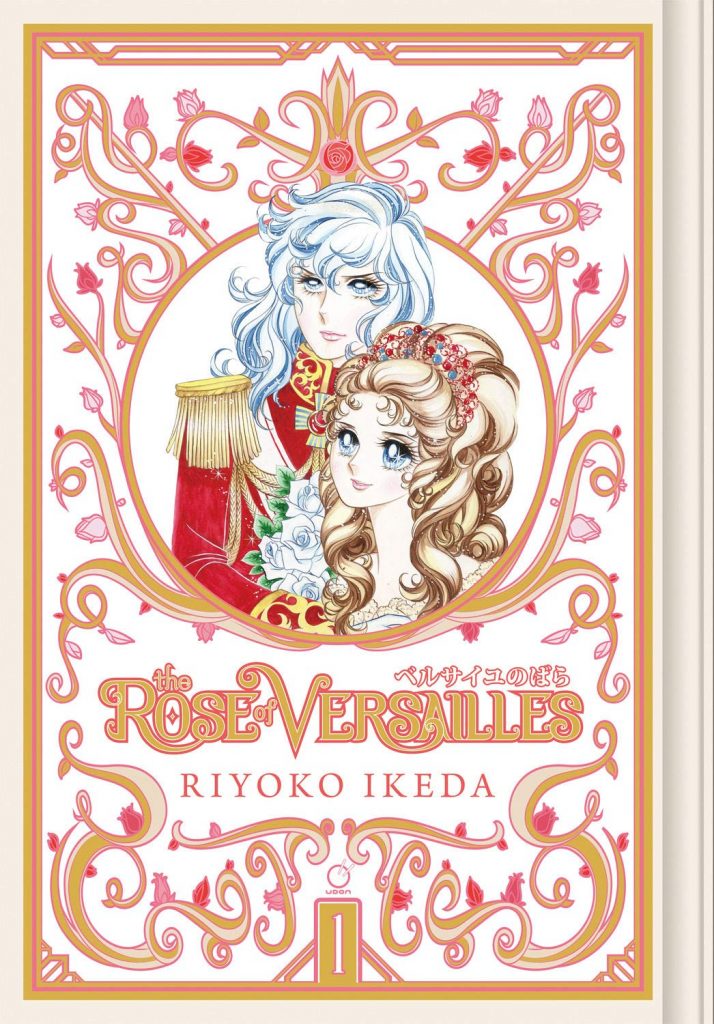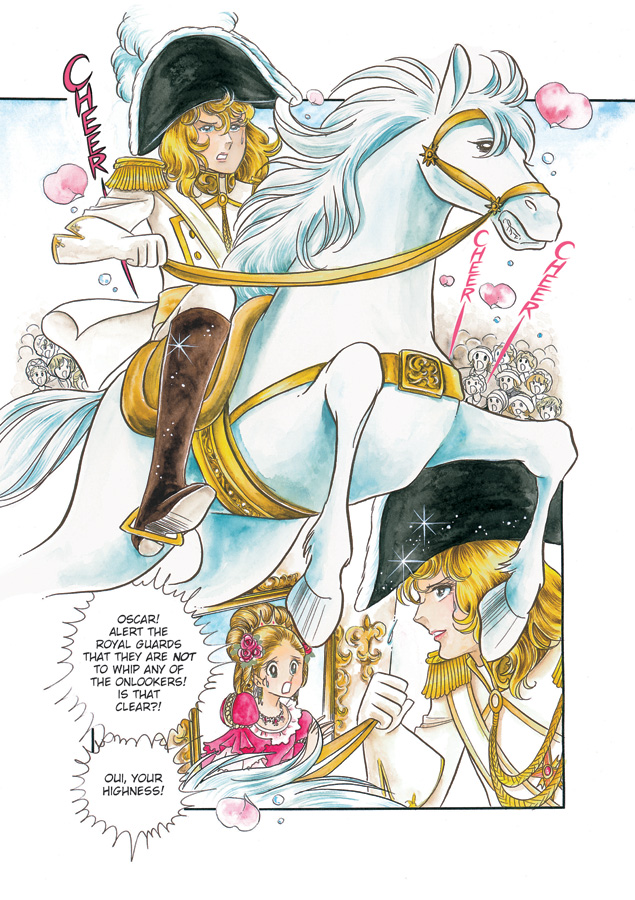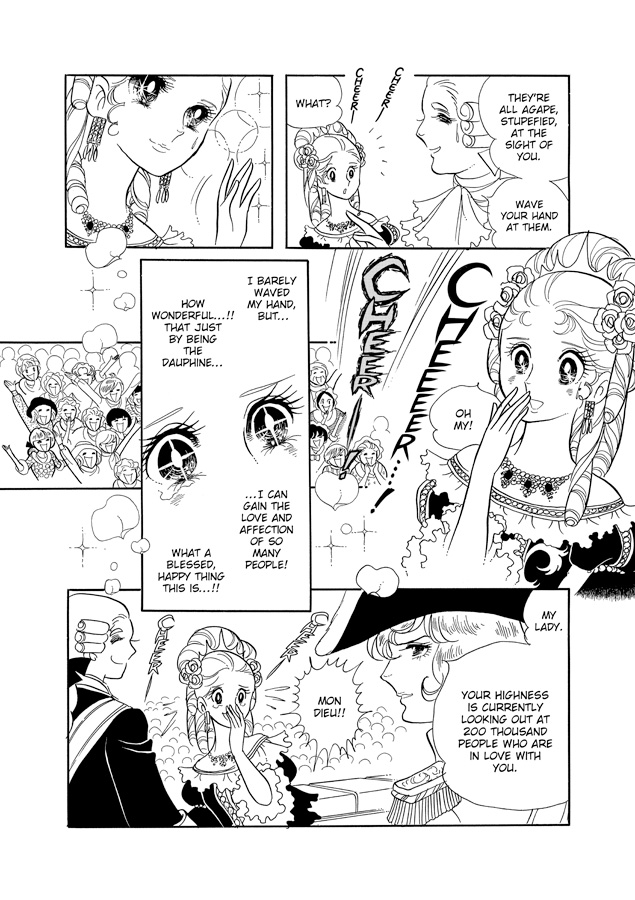Any book about the life of Marie Antoinette and the glittering decadence of Versailles carries with it the long shadow of revolution, imprisonment, and the guillotine. Riyoko Ikeda’s The Rose of Versailles begins not with death, but with three births, all in the year 1755: Marie Antoinette, the future Queen of France, in Austria; her future lover, Count Hans Axel von Fersen, in Sweden; and in France, Oscar François de Jarjayes. Born the sixth daughter of a noble house, Oscar’s disappointed father looks at her for the first time, observes that “her cries are at least as robust as a boy’s,” and decides to raise her as if she were a male heir. Quickly growing into a dashing soldier, Lord Oscar becomes commander of Marie Antoinette’s royal guard and is drawn into the swirling maelstrom of history.

Originally serialized in Weekly Margaret in 1972, Ikeda’s The Rose of Versailles is one of the true landmarks of shojo manga. A sensation in Japan, it was adapted into an anime series, performed on the stage by the Takarazuka Revue, and inspired a 1979 French film by Jacques Demy, to say nothing of its influence on later shojo classics like Revolutionary Girl Utena. Despite its legacy, however, it’s taken nearly 50 years for a complete English translation to be published; to call the release from Udon Entertainment (originally announced in 2015) “long-awaited” is an understatement. Translated by Mari Morimoto, the first volume of Ikeda’s beloved manga is now available as a deluxe hardcover, presented with select color pages on semi-gloss paper. It’s an impressive, beautiful book, one of those rare releases that can truly be called an event.
The Rose of Versailles is operatic in scope, fittingly enough for the heightened reality of these French nobles where a chance meeting at a masquerade can change the fate of a country. As serialized fiction, it’s immediately engaging. Early chapters feature Marie Antoinette and her rivalry with Madame du Barry, Louis XV’s scheming mistress; whether or not the young dauphine will merely speak to du Barry is depicted as a duel of manners, with pointed glances replacing the points of swords. This is only the prologue to the intrigues that follow, including arson, poisonings, and at least one thrilling rescue on horseback. (Also slithering her way into the plot is the viper Jeanne de Valois-Saint-Rémy of the Affair of the Diamond Necklace, foreshadowing future doom for the Queen of France.)
Ikeda depicts Marie Antoinette as a charming, sparkling ingenue, who’s good-hearted but woefully unequipped for the responsibilities thrust upon her. It’s easy to imagine the original Weekly Margaret audience reading about a queen who lived and died two hundred years earlier and seeing themselves in the lively, fashionable girl who had trouble with her schoolwork. One can also envision the red thread connecting Marie Antoinette here with another important, generation-defining shojo heroine, Pretty Guardian Sailor Moon’s Usagi Tsukino.

And yet, The Rose of Versailles may have been a very different manga entirely if not for the character, initially introduced in a supporting role, who was so romantic and original that they were able to steal the spotlight from the Queen of France. Lord Oscar’s reputation as a shojo icon precedes her. Noble and androgynous, she’s too interesting to be left standing on the balcony overlooking Marie Antoinette, and she quickly becomes a much more compelling protagonist (Being entirely fictional, it also helps that her fate hasn’t been already determined by history). Due to her unique position, Oscar can saunter through the female and male-coded spaces of the ballroom and the battlefield, making her a dynamic player in the unfolding drama.
An honorable protector of women, Ikeda also significantly portrays Oscar as an object of same-sex desire, with the ladies of the court openly swooning over her and vying for her attention (“She is our Colonel Oscar, ours!”). There is perhaps no more dashing image in this volume than Oscar in a flowing white shirt, her golden hair cascading over her shoulder as she rescues another young woman from a pond and carries her in her arms. The overheated copy that accompanied each serialized installment thumps like a pounding heart: “WHAT OF ROSALIE, WHO HAS BEEN SUBDUED BY OSCAR…!? THE SENSATIONAL TOUR DE FORCE THAT IS THE DOMINANT TOPIC OF YOUNG GIRLS’ CONVERSATIONS RIGHT NOW!!”

As a visual storyteller, Riyoko Ikeda is exquisite. Her pen waltzes through the book’s many tonal changes, from light comedy to tender romance to sudden violence. She captures the baroque beauty of Versailles in both fashion and character. Marie Antoinette’s gowns are mountains of ruffles, bows, and silks, while Oscar radiates confidence with her leonine mane of hair and the sharp silhouette of a soldier. This is no staid costume drama, however. Ikeda uses her artwork to heighten her characters’ emotions – a heartbroken Marie Antoinette flees Count von Fersen in a flurry of flower petals, and, in a moment of rage, Madame du Barry has her head haloed by flames as she snarls with a mouth full of fangs. Even word balloons become dramatic devices, crackling with electricity when important information is revealed in the wicked cliffhanger that ends this volume.
The Rose of Versailles would still be a good story if it only focused on the simmering melodramas of Marie Antoinette’s court. Its greatness, however, can be found in the fact that it doesn’t settle for a benign fantasy of bygone royalty. If the Versailles here sometimes resembles a pink, frosted, three-tiered cake, Ikeda knows that it tastes like poison. Marie Antoinette’s ascendancy is mirrored by the fall of Rosalie, a poor French girl orphaned by the casual cruelty of the aristocracy. Rosalie is on the verge of survival sex work when she encounters Oscar; their relationship sparks Oscar’s growing class consciousness, and she is torn between her loyalty to the queen and the plight of the people. Stories about social inequality remain just as relevant in 2020 as they did in 1972, though in the era of guillotine memes on Twitter, this manga feels especially timely. A work of sparkling complexity, The Rose of Versailles is a bloom that never fades.

Leave a Reply